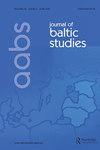Nuclear waste management in Lithuania and Sweden: responses to contingent historical and political circumstances
IF 0.5
4区 社会学
Q2 AREA STUDIES
引用次数: 1
Abstract
ABSTRACT The Baltic Sea region is the site of a considerable number of nuclear power stations. Although predominantly operational, several have been decommissioned and new ones are in the planning stage. The volume of nuclear waste in the region continues to increase, while the development of national nuclear waste programs differs in each country. This article investigates national framings of nuclear waste issues in Lithuania and Sweden in order to understand their articulation in response to particular historical and political circumstances. Following the technopolitical framework, this article engages with the argument that nuclear industry developments create both incentives and constraints for nuclear waste programs that foster various forms of legacies; historical, technological, or political. Firstly, this article sets out the relation between the nuclear industry and nuclear waste issues in each country. Secondly, it reveals how decommissioning policies in both countries streamed nuclear waste programs developed in dissimilar sociopolitical contexts. The final section presents empirical details about constraints and incentives that become visible through analysis of the impact of nuclear policy legacies and continuities on waste regimes, including regulatory, licensing and participation practices, research programs, and technology innovation.立陶宛和瑞典的核废料管理:对突发历史和政治情况的反应
摘要波罗的海地区拥有大量的核电站。尽管主要在运营,但有几艘已经退役,新的还在规划阶段。该地区的核废料数量继续增加,而各国的国家核废料计划发展情况各不相同。本文调查了立陶宛和瑞典核废料问题的国家框架,以了解它们在特定历史和政治环境下的表述。根据技术政治框架,本文提出了这样的论点:核工业的发展为核废料计划创造了激励和约束,从而促进了各种形式的遗产;历史的、技术的或政治的。本文首先阐述了各国核工业与核废料问题之间的关系。其次,它揭示了两国的退役政策是如何在不同的社会政治背景下发展核废料项目的。最后一节介绍了通过分析核政策遗产和持续性对废物制度的影响,包括监管、许可和参与实践、研究计划和技术创新,可以看到的约束和激励的实证细节。
本文章由计算机程序翻译,如有差异,请以英文原文为准。
求助全文
约1分钟内获得全文
求助全文
来源期刊

Journal of Baltic Studies
AREA STUDIES-
CiteScore
1.20
自引率
0.00%
发文量
52
期刊介绍:
The Journal of Baltic Studies, the official journal of the Association for the Advancement of Baltic Studies (AABS), is a peer-reviewed, multidisciplinary journal for the purpose of advancing the accumulation of knowledge about all aspects of the Baltic Sea region"s political, social, economic, and cultural life, past and present. Preference is given to original contributions that are of general scholarly interest. The Association for the Advancement of Baltic Studies is an international, educational, and scholarly non-profit organization. Established in 1968, the purpose of the Association is the promotion of research and education in Baltic Studies.
 求助内容:
求助内容: 应助结果提醒方式:
应助结果提醒方式:


